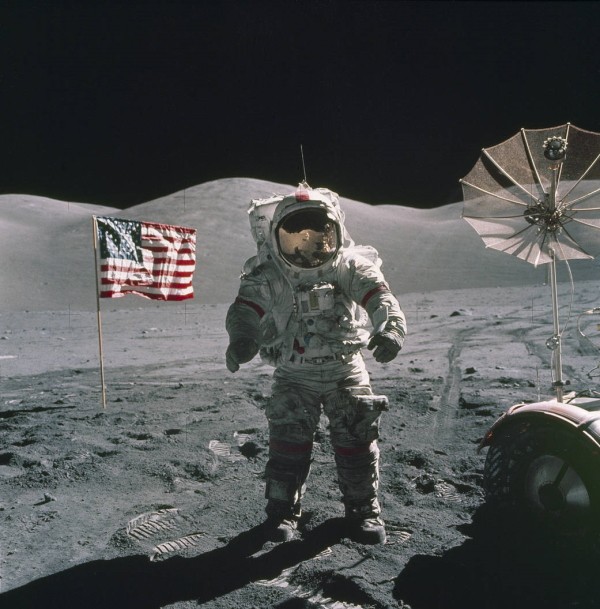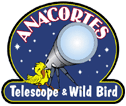50 Years Ago Today – The Day We Left the Moon… “God Willing, We Shall Return”

The voyage of Apollo 17 marked the program’s concluding expedition to the moon. The mission lifted off after midnight on December 7, 1972 from Kennedy Space Center and touched down on the lunar surface on December 11. The crew spent almost 75 hours on the lunar surface, conducted nearly 22 hours of extravehicular activities (EVAs), and traveled almost 19 miles in the Lunar Roving Vehicle (LRV). During lunar lift-off on December 14, Apollo 17 Mission Commander Eugene A. Cernan remarked that the astronauts were leaving as they came, “with peace and hope for all mankind.” In this photo, taken during the second moonwalk on December 12, 1972, Cernan is standing near the lunar rover designed by Marshall Space Flight Center in Huntsville, Alabama. (Image Credit: NASA) (Content Credit: NASA, Brian Odom)
Apollo 17 at 50: A Historian's Look Back at Apollo and to the Future of the Artemis Generation
By Brian Odom, NASA Chief Historian
Fifty years ago today, the crew of Apollo 17 completed humanity’s last voyage to the Moon, leaving the lunar surface for the final time. On December 14, 1972, Commander Gene Cernan spoke the now famous quote, “We leave as we came and, God willing, we shall return -- with peace and hope for all mankind.” Cernan’s words articulated both the stunning success of Project Apollo and the immense melancholy of those who were not ready to see the program conclude.
NASA’s human spaceflight program has spent the intervening 50-year period from Apollo 17 working in low-Earth orbit and preparing to pick up where that program left off. The 135 launches of the Space Shuttle, the building of the International Space Station, and the many lessons learned living and working in the microgravity environment laid the groundwork for Artemis.
On November 16 of this year, NASA took the next major step in returning to the Moon with the launch of Artemis I. Millions around the world watched live as the Space Launch System (SLS) rocket launched the Orion spacecraft on its 25-day mission that saw the un-crewed vehicle log over 1.4 million miles and travel farther (40,000 miles beyond the far side of the Moon) than any human-rated spacecraft has ever traveled.
Orion made its initial flight around the Moon and has returned stunning images rivaling the Apollo 8 “Earthrise.” This historic milestone represents a truly monumental achievement. But this is only the first step.
As historians, we must always consider the deeper context and analytical frameworks. What do past programs, including Apollo, the Space Shuttle, and the International Space Station, tell us about what we can expect from this and the next steps? Will abandoning the Cold War approach of Apollo and embracing a more coalition-building approach that includes commercial and international partners make this new round of lunar exploration more sustainable? Will success for Artemis coupled with potential new markets lead to a revolution in aerospace technology capable of reaching Mars?
As a social historian, I must also ask questions about potential ramifications back on Earth. What cultural impacts might a permanent presence on the Moon ultimately produce? Could becoming an interplanetary species produce a transcendent shift in us as a species? Will expansion beyond low-Earth orbit have positive or negative impacts on economic and social inequality?
Here, the example of Apollo is instructive. That program occurred against the backdrop (and, at times, at the forefront) of one of the most transformative periods in US history. Running parallel with the social revolution of the 1960s, Apollo experienced many incredible triumphs as well as tremendous setbacks (cancellation of several final missions) and tragedies (Apollo 1).
Beyond delivering on President Kennedy’s end-of-the-decade goal and extraordinary scientific discoveries, some of the greatest legacies of that program took place back on Earth. The federal investment in aerospace infrastructure across the southern United States transformed the economics of much of the region. Critical investments in university engineering and science programs created foundations that continue to pay off with technological and scientific breakthroughs. Apollo 8 delivered an uplifting message at the end of a dreadful year (1968) and, with the capture of the “Earthrise” photo, stoked the flames of the environmental movement.
As we watch Artemis I and subsequent lunar missions, I am excited for the next round of amazing scientific discoveries and impressive engineering firsts. Hopefully the lessons of Apollo will prove a helpful framework for discovery both on the Moon and back home. If we are paying attention, I am sure they will.
For more information:
https://www.nasa.gov/centers/marshall/history/gallery/41st_anniversary.html
https://history.nasa.gov/SP-4029/Apollo_17a_Summary.htm
https://astromart.com/news/show/55-years-ago-the-saturn-v-mega-rocket-flies-for-the-first-time
https://astromart.com/news/show/nasas-artemis-program-gateway-to-the-moon-steppingstone-to-mars
https://astromart.com/news/show/honoring-the-24-brave-souls-who-made-the-trip-to-the-moon-and-back
https://astromart.com/news/show/reflections-on-apollo-11-and-the-space-program
https://astromart.com/news/show/it-was-40-years-ago-today-the-day-we-chose-to-go-to-the-moon
https://astromart.com/news/show/happy-birthday-nasa-50-years-of-the-right-stuff
Astromart News Archives:
https://www.astromart.com/news/search?category_id=3&q=.
Check out some of my favorite Words of Wisdom:
https://astromart.com/news/show/words-of-wisdom-my-favorite-quotable-quotes
https://astromart.com/news/show/words-of-wisdom-my-favorite-proverbs-from-around-the-world
Do you enjoy reading these postings?
Then click here and buy the Astromart staff a cup of coffee (and maybe even some donuts):
https://astromart.com/support-options
Funding Member
Sponsors
- BBLABS LLC
- APM-Telescopes
- BW
- Matsumoto Company
- Rouz Astro
- Anacortes Telescope
- Astromart Customer Service
- Desert Sky Astro Products
- ASTROPHOTOGRAPHY BY MARTIN PUGH
- RemoteSkies.net
- astronomy-shoppe
- Bob's Knobs
- Waite Research
- OMI OPTICS USA LLC
- AstroMart LLC
- FocusKnobs
- SellTelescopes.com
View all sponsors



